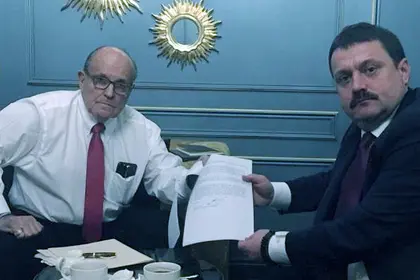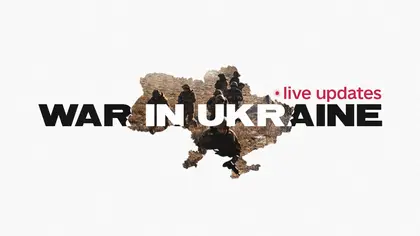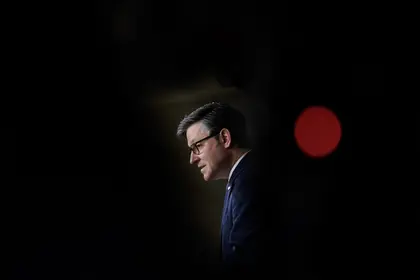A Ukrainian lawmaker who previously met with and gave an interview to Rudy Giuliani, U.S. President Donald Trump’s personal lawyer, has released audio recordings allegedly featuring phone conversations between former U.S. Vice President Joseph Biden and former Ukrainian President Petro Poroshenko.
On May 19, lawmaker Andriy Derkach held a press conference during which he played excerpts of the recordings, alleging that they showed that Biden and American financier George Soros had exerted undue influence over the Ukrainian government under Poroshenko.
He claimed that the recordings demonstrated that the country was under “external control” and said Biden ran the state’s top prosecutor’s office, three political parties in parliament and the Cabinet of Ministers — an outlandish conspiracy theory with no factual backing, but one that plays into a common line pushed by the anti-Western part of Ukraine’s opposition.
Derkach is one of several Ukrainian politicians who have made largely unsubstantiated claims that Biden, the Democratic Party’s de facto nominee for the U.S. presidential election in November, engaged in corruption in Ukraine during his time in office. These Ukrainians have provided fodder for an entire media ecosystem of right-wing news sites, pro-Trump pundits and even indiviuals like Giuliani, who all push the theories in the United States.
Virtually all these claims have stood up poorly to journalistic scrutiny.
Read more: 3 Ukrainian lawmakers doing Trump’s dirty work in scandal
Derkach’s release of the audio recordings — which feature voices that sound very much like Poroshenko, Biden and, briefly, former Secretary of State John Kerry — was clearly intended to further these accusations.
But while they offer an interesting window into the United States’ active support for and involvement in Ukraine after the EuroMaidan Revolution that deposed President Viktor Yanukovych in 2014, they provide virtually no evidence for Derkach’s claims.
Derkach claimed that the audio files were given to him by investigative journalists and were recorded by Poroshenko himself. While they sound authentic, even a casual listener can hear that they have been selectively edited, likely to serve a political purpose.
Firing the prosecutor general
At the center of the accusations against Biden is a claim that he called for the firing of Ukraine’s former prosecutor general, Viktor Shokin, in order to protect private energy company Burisma Holdings, where Bidens’s son Hunter served on the board of directors in 2014-2019.
That claim is half-true. Biden indeed called for Shokin’s ouster and threatened to withhold $1 billion in U.S. aid if the prosecutor general kept his job. The then-vice president was echoing months of demands from Ukrainian civil society, anti-corruption activists, some lawmakers and Ukraine’s Western partners. The reason was straightforward: Shokin had failed to prosecute high-level corruption.
Shokin was fired in April 2016.
However, contrary to the accusations against Biden, Shokin was not investigating Burisma at the time. In fact, prosecutors under Shokin’s supervision sabotaged the Burisma case, as ex-U.S. Ambassador to Ukraine Geoffrey R. Pyatt outlined in a speech on Sept. 24, 2015 in Odesa.
Read more: Trump whistleblower scandal, explained from Ukraine
Unsurprisingly, parts of the recordings that Derkach played in the press conference deal directly with Shokin’s firing.
“Despite the fact that (Shokin) didn’t have any corruption charges, we don’t have any information about him doing something wrong, I especially asked him… to resign,” Poroshenko told Biden in a recording that supposedly dates to Feb. 18, 2016.
Poroshenko said that, despite Shokin allegedly having support in parliament, he agreed and submitted his letter of resignation.
“This is my second step for keeping my promises,” Poroshenko said.
In another recording from April 22, 2016, Biden and Poroshenko discussed who could be appointed prosecutor general. Poroshenko proposed Yuriy Lutsenko, a member of his party who would go on to hold the post from May 2016 to August 2019. However, Poroshenko offered to recall his proposal if Biden thought the nomination of a “politically-motivated figure” was inappropriate.
In another recording supposedly from May 13, 2016, Biden congratulated Poroshenko on installing Lutsenko as prosecutor general.
“It’s going to be critical for him to work quickly to repair the damage that Shokin did,” Biden said, adding that the U.S. was now ready to move forward in signing the $1-billion loan guarantee.
Poroshenko also said he asked Lutsenko to get in contact with the U.S. Embassy and told Biden he would like to find an American or foreign advisor to help the Prosecutor General’s Office in building a new prosecution system. He references an American assistant prosecutor of Ukrainian ancestry, Bohdan Vitvitsky, as a possible option.
Vitvitsky would eventually go on to serve as an advisor to the prosecutor general. Derkach implies that he served as Biden’s “enforcer” in Ukraine, a claim for which he provides no evidence.
In a September 2016 interview with the Ukrainian Weekly, Vitvitsky presented his role as an advisor quite differently. “I wasn’t looking for this,” he said. “It was presented as an opportunity to be helpful in some way that might have a little bit of an impact. It was valuable and important enough for me to drop what I was doing to come here.”
Derkach also claimed that Shokin was investigating Burisma, and Biden wanted to prevent him from learning about $3.4 million paid by Burisma to a company called Rosemond Seneca Bohai LLC. Reuters reported that this money was intended for Hunter Biden and his business associate Devon Archer, but noted that it could not verify the supposed Burisma payment records it had seen or state for certain how much money the younger Biden received.
Read more: Trump, Giuliani drag Ukraine into wild conspiracy theories
While Derkach claimed the elder Biden was afraid this information would have sunk his political career, he did not provide any evidence for that. There is no evidence that this had anything to do with Shokin’s firing.
Coalition troubles
In another call, supposedly on Feb. 18, 2016, Poroshenko complained to Biden about the 19-member Batkivshchyna faction and the 26-member Samopomich party leaving his ruling coalition.
The parties exited after he blocked a no-confidence vote on the government of Arseniy Yatsenyuk, Poroshenko said.
Poroshenko told Biden he did it “because I promised you. Only because of that.”
Under the Constitution of Ukraine, parliament would have had 30 days to form a new coalition. Otherwise, snap parliamentary elections would have to be held. The leadership now lacked legitimacy in parliament and among the public, Poroshenko told Biden.
Commenting on a Biden-Poroshenko phone call from a day later, Feb. 19, Derkach said that the two men discussed buying votes for a parliamentary coalition. But that wasn’t exactly true. In the audio Derkach then played, Poroshenko talked about the difficulty of negotiating a new coalition and criticized vote buying.
“The other factions we can invite, but they speak only the language of political corruption, and I hate the idea after the (EuroMaidan Revolution) to buy the votes,” Poroshenko said.
In subsequent phone calls Derkach played, Biden and Poroshenko discussed the difficulties of negotiating to form a new coalition and the possibility of Natalie Jaresko, Ukraine’s American-born finance minister from December 2014 to April 2016, becoming prime minister.
Poroshenko even asked Biden if U.S. partners could increase pressure on the reform-oriented Samopomich party to support her candidacy as prime minister because the U.S. had given grants to the party.
On April 14, 2016, the Ukrainian parliament confirmed a new coalition and Cabinet led by Prime Minister Volodymyr Groysman, an associate of Poroshenko.
But in a May 13, 2016 call, Poroshenko continued to criticize U.S. support for Samopomich and asked Biden to put pressure on the party to convince them to vote for constitutional amendments required for court reform.
Poroshenko even claimed that he told then-U.S. Ambassador Geoffry Pyatt: “Please don’t give the grants to the Samopomich, do not give them the money. Because this is not financing for the opposition party. This is financing for an absolutely irresponsible political leader.” “We will do everything to help you get the votes,” Biden appears to say as the recording abruptly cuts off.
PrivatBank nationalization
In another call supposedly dated Nov. 16, 2016, shortly after Donald Trump was elected president, Biden encouraged Poroshenko to take action on Ukraine’s undercapitalized PrivatBank to avoid trouble with the new U.S. president.
The bank, the largest lender in Ukraine, would be nationalized from its previous owners, oligarch Ihor Kolomoisky and his business partner, just a month later and the government would discover a $5.5 billion hole in its ledgers due to insider loans.
In the call, Biden termed Kolomoisky a “pain in the ass,” and told Poroshenko to set a date to take action on PrivatBank in order to receive a new tranche of aid from the International Monetary Fund (IMF). He termed this a matter of “economic as well as physical security” for Ukraine.
“I don’t want Trump to get into the position where he thinks that he’s about to buy onto a policy where the financial system is going to collapse and he’s going to be looked to to pour more money into Ukraine,” Biden said. “That’s how he’ll think about it before he gets sophisticated enough to know the details.
In April 2017, Ukraine would receive $1 billion in aid from the IMF.
But Biden’s comments on Trump would prove to be surprisingly prescient. In summer 2019, Trump would temporarily halt aid to Ukraine in an attempt to extract an investigation into Biden from President Volodymyr Zelensky. That would serve as one of the events that would lead to his impeachment in December.
No smoking gun
For all Derkach’s claims, his presentation of the audio was largely smoke and mirrors. He repeatedly drew extreme conclusions from fairly mundane details of the phone conversations.
However, the presentation was likely also intended to be embarrassing for Poroshenko. The audio clips repeatedly included the beginnings of the call, when Poroshenko would greet Biden profusely.
“All the time when I hear your voice, it’s a great pleasure for me,” he said in the March 22, 2016 call.
At another point, Poroshenko bragged about raising natural utilities tariffs more than the IMF demanded, an unpopular move in Ukraine.
But despite all Derkach’s claims and insinuations of wrongdoing by Biden and Poroshenko, the recordings lack anything even remotely close to a smoking gun.
The closest they come is with one small detail: Poroshenko told Biden he granted former Economy Minister Aivaras Abromavicius, “in violation of the law, a security guard from the secret service.
You can also highlight the text and press Ctrl + Enter







Comments (0)